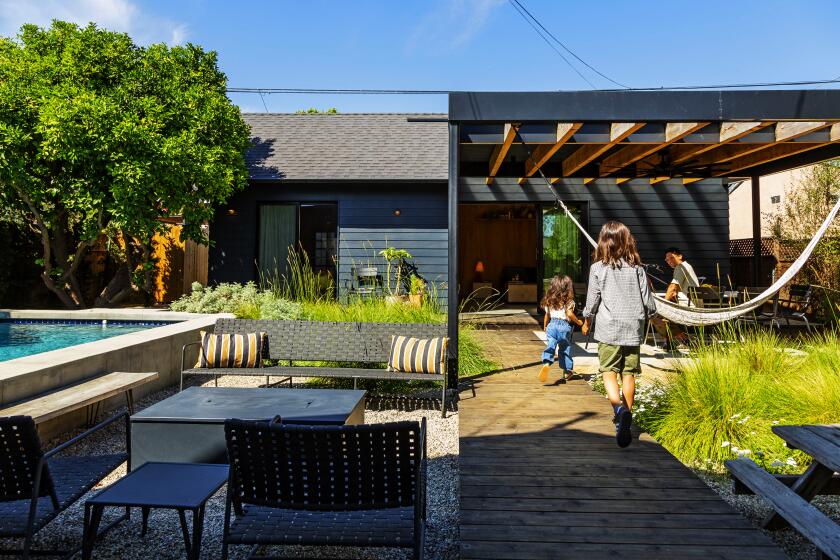Wiltern Foreclosure a Lesson in Difficulty of Saving City History
- Share via
Preservationist Wayne Ratkovich won the battle to save the landmark Wiltern Theatre complex from the wrecking ball back in 1981. But like many Southern California developers who have tried to preserve historic properties, he couldn’t save his project from financial collapse.
The green-ceramic-clad building that has towered over the intersection of Wilshire Boulevard and Western Avenue since 1931 was taken back in foreclosure several months ago by lender General Electric Capital Corp. and sold last week for $19 million to Hertz Group, a Los Angeles firm that specializes in snapping up historic buildings, many of them after they’ve been foreclosed on by their lenders.
Hertz’s success in buying historic buildings at bargain prices is testament, analysts say, to the problems developers have traditionally faced in making historic preservation projects profitable.
“Although there is demand for historic reuse, it has been very difficult to make them work financially because of building-code problems and the difficulty of working with the city and city requirements,” says David Zoraster, a vice president with the appraisal group of real estate company CB/Richard Ellis Group and a member of the Los Angeles Conservancy.
Ratkovich says he tried to renegotiate with the lender to keep the building, which suffered with the rest of the Mid-Wilshire area after the 1992 riots and the Metro Rail subway construction that followed. But ultimately, his firm’s financial partner in the complex, Bronco Ltd., headed by the Braun family of Pasadena, decided to back away from a new deal with GE.
“I don’t think they had the same confidence in the property that I have,” Ratkovich says. “It’s unfortunate, because in a year or two this property would have gotten to the point where it would have worked itself out in a very satisfactory way.”
Ratkovich, who purchased the building for $6.3 million in 1981, acknowledges spending an additional $24 million on the project, which now includes a supermarket and parking structure.
Hertz paid in cash and closed escrow on the building in just 10 days. Officials say they plan to continue operating the complex as before. It includes a successful 2,355-seat live theater, a 12-story office tower called the Pellissier Building, ground-floor shops and restaurants and the Ralphs grocery store. However, brokers speculate the new owners will sell the Ralphs--one of the chain’s most profitable, Ratkovich says, and the most lucrative part of the project.
Buying older buildings at bargain prices has been Hertz’s strategy in recent years. The company has bought other bank assets, including the Oviatt Building, built downtown in 1928 (it was renovated by Ratkovich and later sold for a hefty profit to Mitsui) and nearby Popular Center, built in 1903.
“The [preservationist] developers of historic buildings often had good intent and did beautiful work, but unfortunately economic factors did not go their way; they either overspent or their timing was off,” says Kit Marchel, Hertz Group president.
Ironically, the sale of the 12-story Wiltern office tower comes when the Mid-Wilshire district is starting to show signs of a real estate recovery. Office vacancy in the district has edged down to 25% in the third quarter of this year, a marked improvement from the 33.6% rate at the bottom of the market in 1994.
Likewise, monthly rents, while still well below those of downtown and the Westside, have surged to an average of $1.11 per square foot in the third quarter, from 87 cents in 1994.
The office tower is 75% leased, compared with 57% at this time last year. The retail space is fully leased. Marchel says the project should be immediately profitable.
It is the second preservation struggle Ratkovich has faced this decade, after a successful renovation of the Art Deco-style Oviatt. Ratkovich’s renovation of the historic Chapman Market on 6th Street was also derailed by street construction and later sold at a steep discount.
Still, Ratkovich, who has an office in the Wiltern tower, says he doesn’t regret his 17-year battle to save the building.
“We are proud of this. It’s a legacy we will leave and an important building in the evolution of L.A.’s historic preservation ethic.”
He says he plans to look for other investments nearby.
More to Read
Sign up for Essential California
The most important California stories and recommendations in your inbox every morning.
You may occasionally receive promotional content from the Los Angeles Times.










